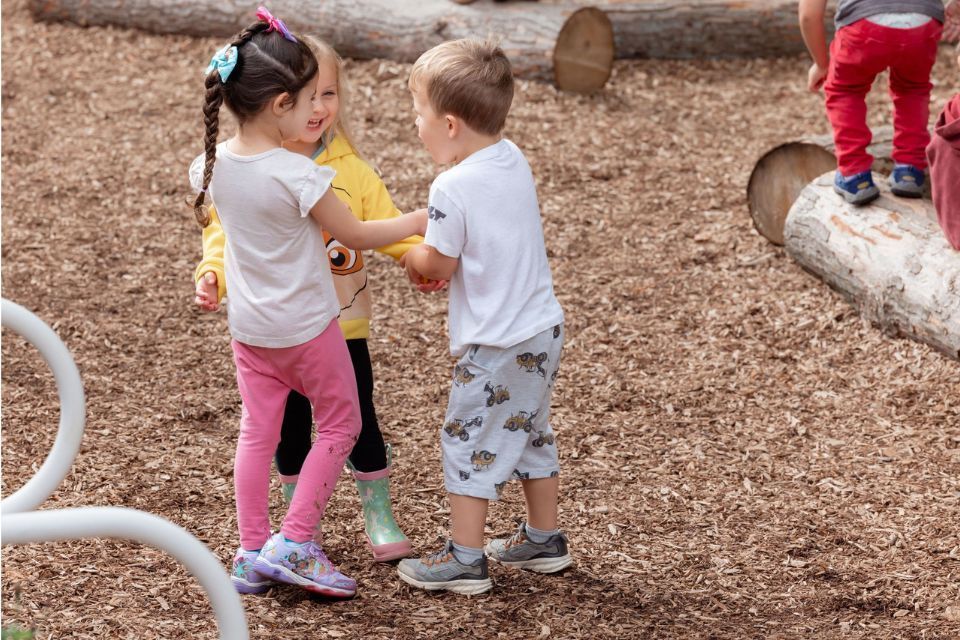Navigating Friendships and Social Challenges: A Montessori Parent’s Guide to Building Resilience and Empathy

Helping Young Children Learn Friendship and Empathy
The preschool years are full of joyful growth — and, at times, tricky social moments. As children learn how to communicate, share, and collaborate, it’s natural for challenges to arise. A child may want to join a game that’s already in progress, feel left out by a friend, or struggle to express frustration with words.
These early social experiences are an important part of learning how to relate to others. In Montessori classrooms, we see each moment — even the hard ones — as opportunities to help children build empathy, communication, and confidence.
As parents and caregivers, our instinct is often to protect our children when they come home upset. Yet these moments also give us the chance to model resilience and guide them toward positive solutions.
Common Social Challenges
Throughout early childhood, children experiment with both language and behavior. They might test how words make others feel, experience frustration when waiting to take turns, or become upset when something doesn’t go their way.
Sometimes, children may say something unkind or exclude a peer simply because they’re still learning what friendship looks like.
These experiences aren’t signs of failure — they’re a natural part of social growth. What matters most is how adults help children navigate and learn from them.
Three Simple Steps to Support Your Child
When social challenges come up, Montessori principles can guide our response: start with empathy, pause before reacting, and build skills together.
Step One: Pause and Regulate Our Own Emotions
Children are highly attuned to how we feel. Before jumping into action, take a moment to pause. This helps us respond calmly and thoughtfully, rather than out of frustration or protectiveness.
Step Two: Validate Feelings
Children need to know that their emotions are safe and normal. Simple phrases like:
- “I’m so sorry that happened.”
- “That must have felt really hard.”
- “How are you feeling now?”
Acknowledging emotions builds trust and connection. It’s best to stay calm and listen without trying to immediately fix the situation — this teaches children that they can manage big feelings with support.
Step Three: Teach Problem-Solving Skills
Once children feel heard, they’re ready to think about what to do next. Try this four-step process:
Brainstorm: Invite your child to think of two or three ideas to try next time.
Model:
Role-play or act it out together — using humor or stuffed animals can help.
Practice: Give your child a chance to rehearse what they might say or do.
Plan: Choose one idea to try for a few days, and talk about how it went.
This approach helps children develop flexibility, empathy, and independence.
Putting It Into Practice
If your child felt left out at school, you might brainstorm ways to ask friends to join or start a new activity. If your child feels uneasy about another child’s behavior, you can discuss setting boundaries or speaking with a teacher for help.
It can also be helpful to communicate with your child’s teacher. Montessori educators value timely, collaborative communication — it allows us to guide children through challenges in real time and support consistent messages between home and school.
Building Compassion and Confidence
It’s natural to want to shield our children from social discomfort, but these small struggles help them develop empathy and strength. When we approach these moments with compassion — rather than blame or fear — our children learn to do the same.
The social skills children gain in early childhood — problem-solving, self-advocacy, and empathy — become the foundation for lifelong relationships.
At Twin Parks Montessori, we nurture these qualities every day. Through guided independence and peaceful communication, children learn to understand themselves and others — essential skills for a caring and connected life.
We invite you to visit our school here on the Upper West Side of Manhattan to see how Montessori helps children grow into thoughtful, resilient friends.

